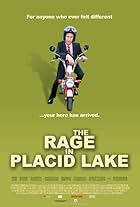Distraught Japanese businessman obsessed with Citroën DS (French car brand nicknamed Goddess) and a troubled blind 17-year-old Aussie girl who promised to sell him one drive through the Aust... Read allDistraught Japanese businessman obsessed with Citroën DS (French car brand nicknamed Goddess) and a troubled blind 17-year-old Aussie girl who promised to sell him one drive through the Australian Outback to kill her abusive grandfather.Distraught Japanese businessman obsessed with Citroën DS (French car brand nicknamed Goddess) and a troubled blind 17-year-old Aussie girl who promised to sell him one drive through the Australian Outback to kill her abusive grandfather.
- Awards
- 4 wins & 3 nominations total
John Boxer
- Barman
- (as Johnny Boxer)
- Director
- Writers
- All cast & crew
- Production, box office & more at IMDbPro
Featured reviews
Rose Byrne's performance alone makes this film worth a look (it still airs occasionally on sundance). Actors who take on the challenging role of blind characters are nothing new- but to see a talented actress take to it with total commitment and still be very believable and not over the top is something special. Rose Byrne is brilliant here as B.G. and really shines in the more subtle moments, which are the primary driving force for this Clara Law film.
The theme of incest abuse and it's lingering affects through generations make for very heavy subject matter that would otherwise threaten to undermine the film's subtle tone - but it's told in flashback here and works surprisingly well. The comparisons of style to Wenders and Jarmusch are apt since it is precisely the more subtle scenes in this film that resonate more as the viewer gets drawn into the lives and past histories of this unlikely couple.
Not a perfect film by any means - the loving yet determinist, religious mother, Marie could have been fleshed out more, as well as the male lead - but the real gem here is Rose Byrne. Disregard the fluff roles from wicker park and troy, this is arguably her best performance to date.
The theme of incest abuse and it's lingering affects through generations make for very heavy subject matter that would otherwise threaten to undermine the film's subtle tone - but it's told in flashback here and works surprisingly well. The comparisons of style to Wenders and Jarmusch are apt since it is precisely the more subtle scenes in this film that resonate more as the viewer gets drawn into the lives and past histories of this unlikely couple.
Not a perfect film by any means - the loving yet determinist, religious mother, Marie could have been fleshed out more, as well as the male lead - but the real gem here is Rose Byrne. Disregard the fluff roles from wicker park and troy, this is arguably her best performance to date.
In movies - road movies especially - we are looking for change in the characters, the relationships and possibly the balance between two themes. In the Goddess we see Deidre become more whole, at a physical level by wanting and experiencing tender lovemaking. And debatably in the end as her search to confront her dad/granddad is fulfilled - death and his death in particular no longer an obsession. What of the male character though? Although very well played and amusing - what journey does he really undertake? Has he learned to drive with his eyes closed? Learned to love a being without scales?
And in looking for themes that may be juxtaposed or in tension with each other - yes there is Megacity Vs Outback, there is beauty vs ugliness, black holes vs religion, responsibility for yourself vs the excuse of horrid childhood - but for me somehow they were a bit fitted in, if any one stands out - perhaps it is travelling with a purpose vs with your eyes closed, and the frightning thing of travelling with a purpose (to buy the car or kill your dad) turns out to be: What then? What do you do next? Perhaps being able to travel with your eyes closed is a better skill after all.
And in looking for themes that may be juxtaposed or in tension with each other - yes there is Megacity Vs Outback, there is beauty vs ugliness, black holes vs religion, responsibility for yourself vs the excuse of horrid childhood - but for me somehow they were a bit fitted in, if any one stands out - perhaps it is travelling with a purpose vs with your eyes closed, and the frightning thing of travelling with a purpose (to buy the car or kill your dad) turns out to be: What then? What do you do next? Perhaps being able to travel with your eyes closed is a better skill after all.
Directionless japanese internet thief goes to Australia to buy a Goddess (a Citroen 2CV) and meets a blind women. They travel through Australia together and flashbacks into the women's history reveal a terrifying yet simple story about her childhood, including sexual abuse and religious fanatism. While being displayed in beautiful pictures using very interesting camera technique, I experienced the movie as an overly long trip into the world of simply insane people. Too much suffering without one useful comment was too much for me. The absurd end spoiled all the sympathy I had for the movie while I watched it, leaving me with the question: "What the hell did Clara Law want to express/tell/explain with this movie?" I didn't enjoy searching for the answer at all.
I went into the Cinema expecting... I don't know what. I knew it was a road trip picture with a Japanese man and Australian woman... they looked pretty enough on the poster. What I didn't expect was two very real people, scared, vulnerable and eccentric characters on a journey across Australia that becomes luminous and intoxicating.
The visual style of the film /cinematography, while gorgeous, was at first distracting... what some people would consider artsy. But as the story unfolds, the visual look of the film matches with the messy, hypnotic storyline and its characters.
A beautiful film, one with an unexpected emotional wallop.
The visual style of the film /cinematography, while gorgeous, was at first distracting... what some people would consider artsy. But as the story unfolds, the visual look of the film matches with the messy, hypnotic storyline and its characters.
A beautiful film, one with an unexpected emotional wallop.
Not many people have seen this film. Those who have seen it, will either hate it or love it. I loved it.
The movie starts with a computer screen that says: I want to buy GOD.
The Prologue doesn't have any human voices. The world the director shows of Japan is obvious. A world of Japanese high-tech. Everywhere there are machines, nobody lives without it. Even as they communicate. As well as the running is been done on a machine.
Clara Law has a very interesting and personal view which shows us her own interesting personality that she is. Because of that movie I can't let go of that.
She succeeds in showing us her own vision of The Goddess of 1967 because she stays consequent by creating a contemporary and postmodern feeling. A feeling she got from her own environment. Born in Macau, studied English literature in Hong Kong. Afterwards Film in London and lives with her husband in Australia.
What Clara Law tries to explain in her movie is sort of autobiographic, it is obvious that she reflects this on the two protagonists. Both characters living in two completely different countries and cultures. Clara Law doesn't work this movie out in a shallow kind of way. She does it within a own creative way and lets the characters explore each other
One character JM appears to be having everything he wants. Financial that is. He is so wealthy he believes he can buy god. Therefore he wants to buy this is beautifully car called the CITROEN DS from 1967. The GODdess. For JM this means freedom. Free of all the big luxury, being unhooked of all the machines.
The other character is BG. A girl who has been blind for all her life. Because of a suddenly death of the dealer of the car, BG will lead JM the way to the real owner of the car. Or so she says.
Once they are on the road with the car, you can follow the mental way of both characters. On the road the flashbacks follow and the viewer learns the pain and history of the characters and why the are what they are.
Neither silent or moving. Neither perceivable or imperceptible Neither nothing or everything. A state of mystery, paradox, ambiguity That is what I tried to capture in this film. CLARA LAW
Thank you Clara Law.....
The movie starts with a computer screen that says: I want to buy GOD.
The Prologue doesn't have any human voices. The world the director shows of Japan is obvious. A world of Japanese high-tech. Everywhere there are machines, nobody lives without it. Even as they communicate. As well as the running is been done on a machine.
Clara Law has a very interesting and personal view which shows us her own interesting personality that she is. Because of that movie I can't let go of that.
She succeeds in showing us her own vision of The Goddess of 1967 because she stays consequent by creating a contemporary and postmodern feeling. A feeling she got from her own environment. Born in Macau, studied English literature in Hong Kong. Afterwards Film in London and lives with her husband in Australia.
What Clara Law tries to explain in her movie is sort of autobiographic, it is obvious that she reflects this on the two protagonists. Both characters living in two completely different countries and cultures. Clara Law doesn't work this movie out in a shallow kind of way. She does it within a own creative way and lets the characters explore each other
One character JM appears to be having everything he wants. Financial that is. He is so wealthy he believes he can buy god. Therefore he wants to buy this is beautifully car called the CITROEN DS from 1967. The GODdess. For JM this means freedom. Free of all the big luxury, being unhooked of all the machines.
The other character is BG. A girl who has been blind for all her life. Because of a suddenly death of the dealer of the car, BG will lead JM the way to the real owner of the car. Or so she says.
Once they are on the road with the car, you can follow the mental way of both characters. On the road the flashbacks follow and the viewer learns the pain and history of the characters and why the are what they are.
Neither silent or moving. Neither perceivable or imperceptible Neither nothing or everything. A state of mystery, paradox, ambiguity That is what I tried to capture in this film. CLARA LAW
Thank you Clara Law.....
Storyline
Did you know
- TriviaThe two main characters of the film are never named but are listed in the credits as B.G. and J.M. This stands for Blind Girl and Japanese Man respectively.
- ConnectionsReferenced in Bad Boy Bubby: Being Bubby (2005)
- SoundtracksThe Flying Dutchman
Written by Richard Wagner
- How long is The Goddess of 1967?Powered by Alexa
Details
- Release date
- Country of origin
- Languages
- Also known as
- Der Japaner und die Göttin
- Filming locations
- Lightning Ridge, New South Wales, Australia(and environs)
- Production company
- See more company credits at IMDbPro
Contribute to this page
Suggest an edit or add missing content


























